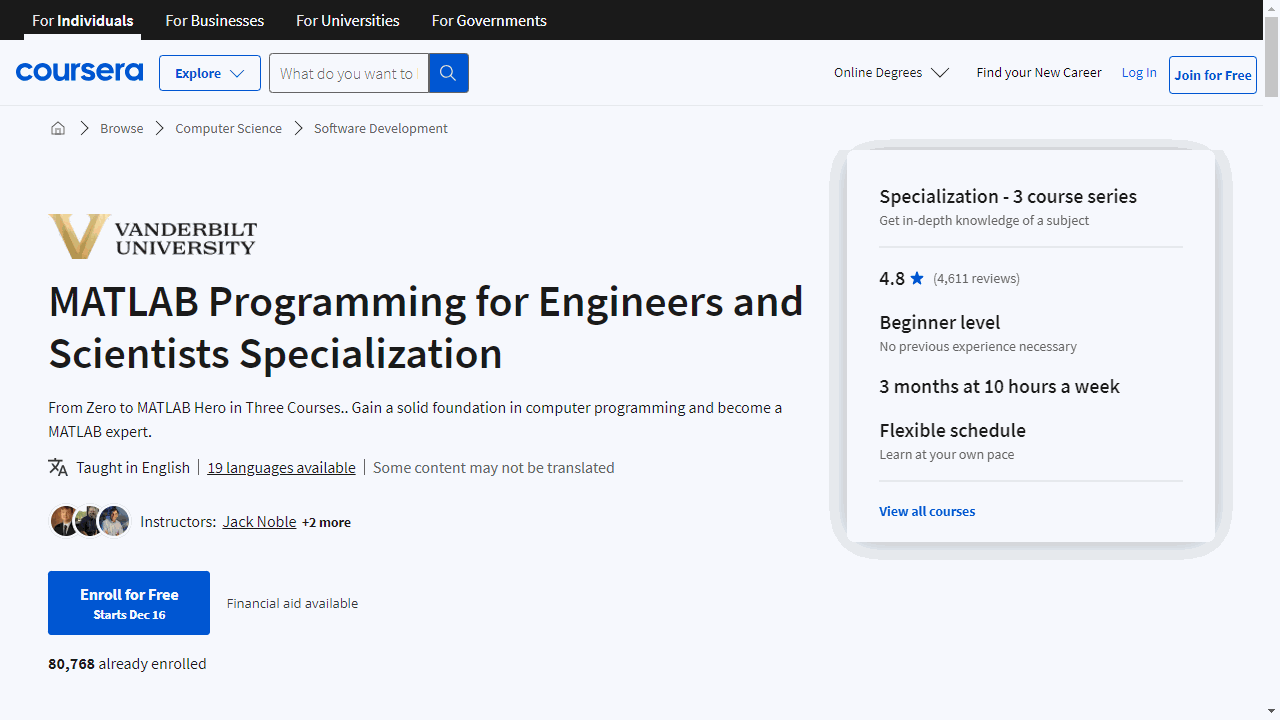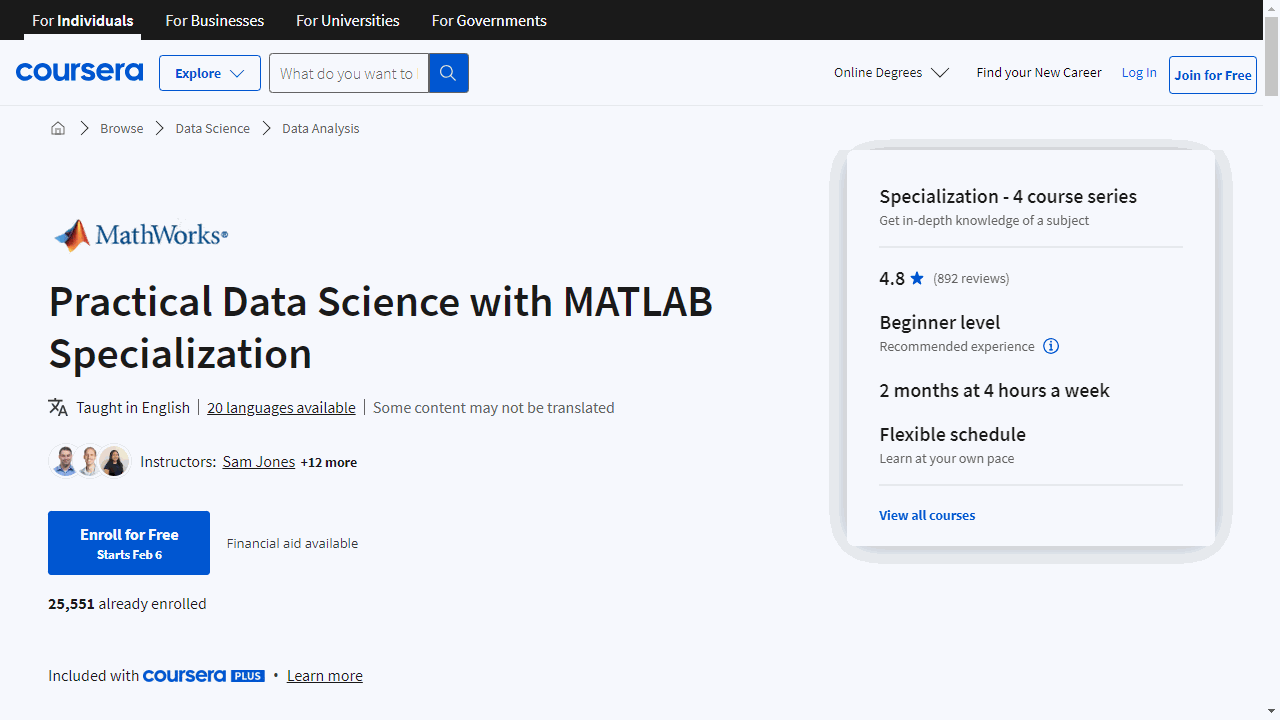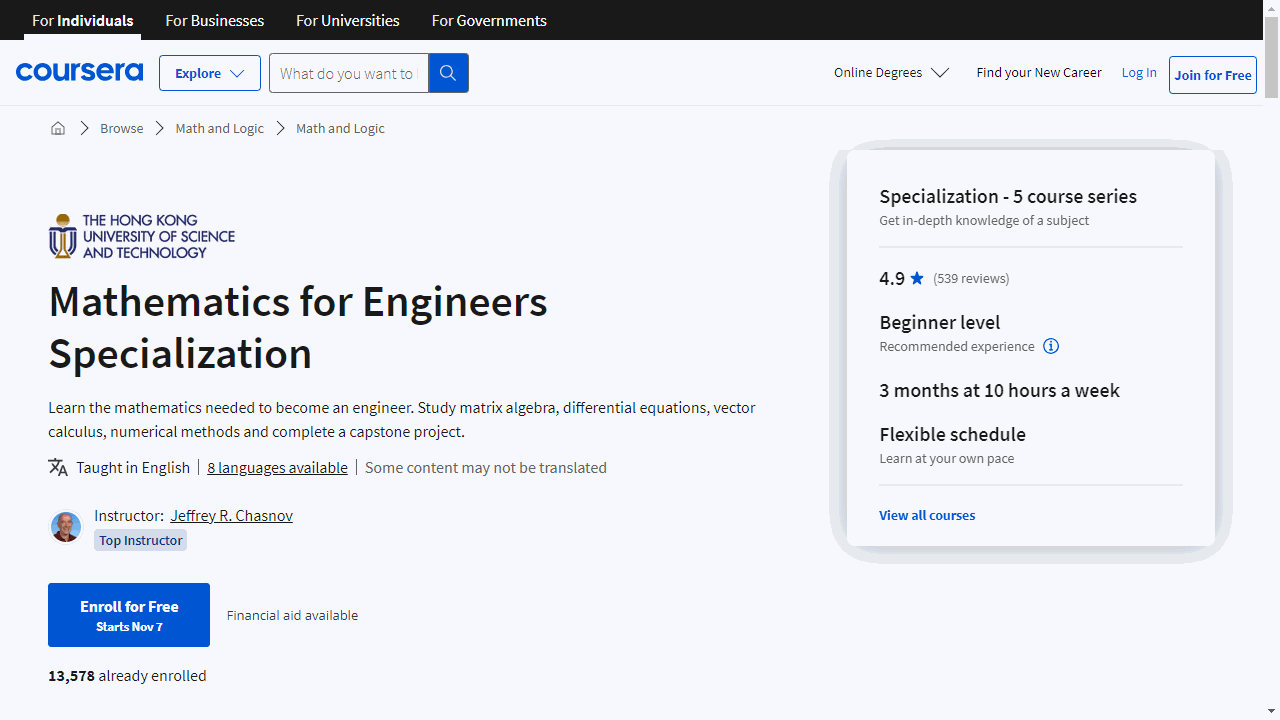MATLAB is a powerful programming language and numerical computing environment widely used by engineers, scientists, and researchers.
It simplifies complex mathematical calculations, data analysis, and visualization tasks, enabling you to solve real-world problems efficiently.
Learning MATLAB empowers you to develop sophisticated applications, explore data-driven insights, and contribute to cutting-edge research.
Finding the right MATLAB course on Coursera can be a challenge, with so many options to choose from.
You want a course that’s comprehensive, engaging, and taught by experts, but also fits your learning style and career goals.
For the best MATLAB course overall on Coursera, we recommend MATLAB Programming for Engineers and Scientists Specialization by Vanderbilt University.
This specialization provides a comprehensive introduction to MATLAB programming, covering everything from basic syntax and data structures to advanced concepts like object-oriented programming and data visualization.
The course is designed to be hands-on, with interactive exercises and real-world applications to solidify your understanding.
While this is our top pick, there are other excellent options available.
Keep reading to discover more recommendations for different learning levels, specific areas of MATLAB, and even career goals.
MATLAB Programming for Engineers and Scientists Specialization
Provider: Vanderbilt University
Starting with “Introduction to Programming with MATLAB” where you’ll learn essential programming concepts like variables and functions, and how to manage data types in MATLAB.
This course stands out because MATLAB simplifies complex problems, making it a valuable skill for your career.
Plus, you get a free MATLAB Online license and access to an eBook for extra support.
Next, “Mastering Programming with MATLAB” builds on what you’ve learned.
Dive into advanced programming techniques such as recursion and vectorization.
You’ll also explore Object Oriented Programming and design your own graphical user interfaces.
This course is designed to make your code more efficient and your applications more robust.
For those interested in data and visuals, “Introduction to Data, Signal, and Image Analysis with MATLAB” is ideal.
You’ll discover how to represent and manipulate signals, images, and data in MATLAB.
Learn data visualization for complex datasets, apply machine learning for prediction, and master image processing techniques.
This course equips you with the skills to analyze and present data effectively.
Practical Data Science with MATLAB Specialization
Provider: MathWorks
This series guides you from foundational concepts to advanced applications, making it ideal if you aim to master MATLAB for data analysis and predictive modeling.
The journey begins with “Exploratory Data Analysis with MATLAB.”
This course equips you to approach data scientifically, even without a programming background.
You’ll learn to navigate MATLAB’s interactive features, enabling you to dissect data, compute statistics, and generate code automatically.
By the end, you’ll confidently visualize data, including mapping severe weather events, and share your insights through interactive documents.
Building on this foundation, “Data Processing and Feature Engineering with MATLAB” delves into preparing data for predictive modeling.
It covers essential techniques for cleaning data, handling missing information, and merging datasets.
You’ll also explore handling complex data types like text and images, setting the stage for advanced analysis.
“Predictive Modeling and Machine Learning with MATLAB” further advances your skills.
Here, you’ll dive into machine learning, applying a full workflow from data preparation to model training and evaluation.
The course emphasizes practical application, teaching you to select and fine-tune models using MATLAB’s intuitive apps.
The capstone, “Data Science Project: MATLAB for the Real World,” challenges you to apply your skills on a comprehensive project.
You’ll navigate the entire data science workflow, showcasing your ability to import, clean, model, and present data.
This project is your opportunity to demonstrate your newfound expertise in a real-world context.
Throughout these courses, you’ll acquire key skills in data analysis, visualization, feature engineering, and machine learning, all within the MATLAB environment.
Mathematics for Engineers Specialization
Starting with “Matrix Algebra for Engineers,” you’ll delve into the essentials of matrices, a foundational tool in engineering problem-solving.
The course is structured with concise videos, complemented by problem sets and quizzes to reinforce your learning.
By the end of the four-week course, you’ll have a firm grasp on linear equations, vector spaces, and the key concepts of eigenvalues and eigenvectors.
Moving on to “Differential Equations for Engineers,” you’ll explore the theories and applications of differential equations.
Over six weeks, you’ll progress from first-order to partial differential equations, equipping you with the skills to model and analyze dynamic systems.
“Vector Calculus for Engineers” expands your calculus toolkit into multiple dimensions, crucial for fields like electromagnetism and fluid mechanics.
You’ll learn about vector fields, multivariable integration, and the pivotal theorems of vector calculus.
“Numerical Methods for Engineers” introduces you to the numerical techniques essential in engineering analysis.
This course emphasizes practical application, teaching you to use MATLAB to solve numerical problems. By the end, you’ll be adept at using computational tools to tackle complex engineering tasks.
The specialization culminates with “Mathematics for Engineers: The Capstone Course,” where you’ll apply your accumulated knowledge to a project in computational fluid dynamics.
This hands-on experience is a chance to solidify your skills and demonstrate your ability to solve engineering problems using MATLAB.
The structure of the courses—with regular quizzes and problem sets—ensures that you can track your progress and solidify your understanding as you go.
Frequently Asked Questions
What is Simulink?
Simulink is a powerful block-diagramming tool that is integrated with MATLAB, allowing users to model, simulate, and analyze dynamic systems and embedded systems.
It provides a graphical programming environment where users can design complex systems by connecting blocks that represent different components or functions.
With Simulink, you can simulate and model a wide range of systems, from electrical circuits and mechanical assemblies to communication systems and control algorithms.
It offers a comprehensive set of blocks for various domains, including signal processing, control systems, communications, and more.



